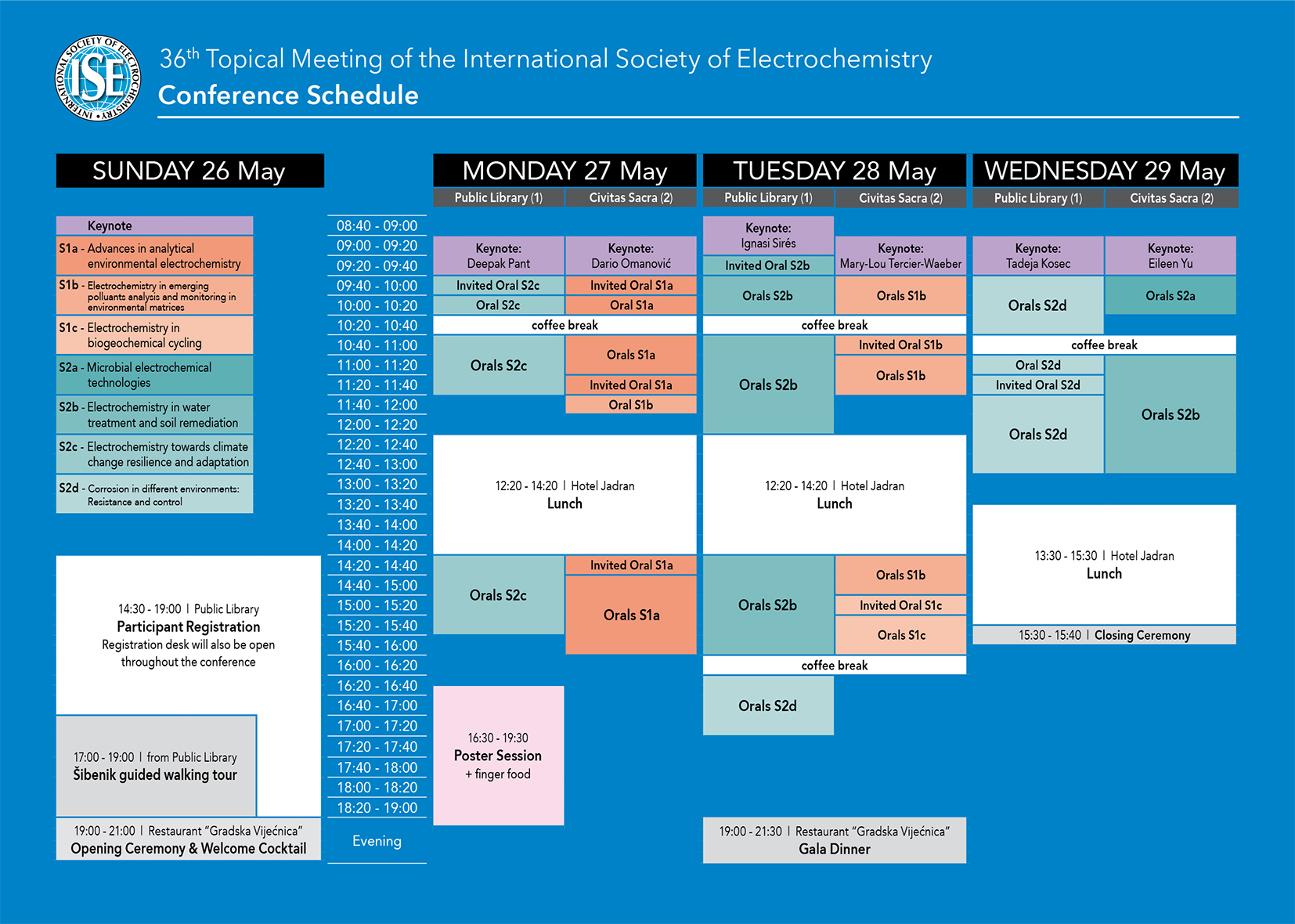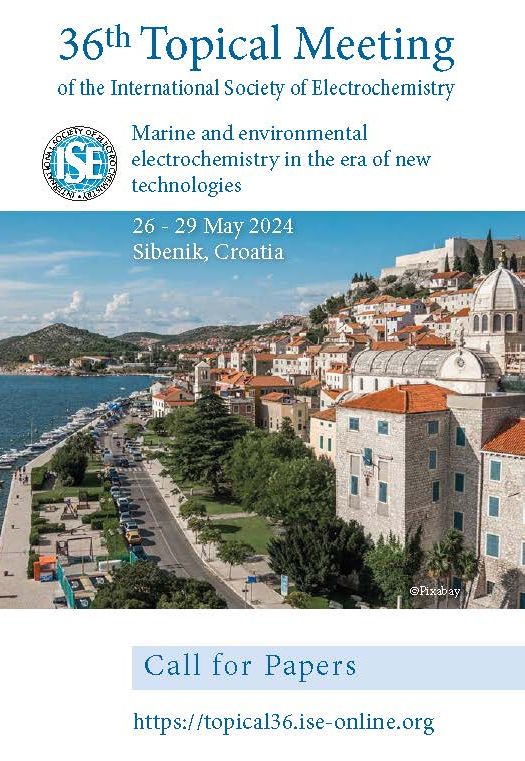Scientific Program

The environmental consequences of industrialisation and climate change are a serious problem worldwide. In view of these global problems, there is an urgent need to design and develop strategic research and analytical techniques with high effectiveness and precision that can be used in marine and environmental research. Versatile electrochemistry, as a well-established global scientific field dealing with the interactions between electrical energy and chemical changes, now offers the possibility to perform a wide range of qualitative and quantitative studies of various organic and inorganic compounds, as well as processes, mechanisms, etc. in a variety of natural matrices. This environmental electrochemical meeting aims to share existing knowledge and new ideas between theoretical and experimental electrochemists and electroanalysts to improve the application of electrochemical methods in marine and environmental research today and in the future. We are looking for new trends in technology as well as new needs for investigations in times of global climate change.
Furthermore, we would like to encourage and invite especially young scientists (PhD students, postdocs) to participate, as the Meeting is a chance to present themselves, discuss their work and establish contacts.
Authors are invited to submit their papers dealing with all aspects of the application of electrochemistry in marine and environmental research. Due to the great diversity and versatility of electrochemistry, specific topics include, but are not limited to:
Symposium 1: Marine and environmental electrochemistry: from fundamental research to routine application
Topics:
- Advances in analytical environmental electrochemistry
- Electrochemistry in emerging pollutants analysis and monitoring in environmental matrices
- Electrochemistry in biogeochemical cycling
Symposium 2: Electrochemistry as a resource
Topics:
- Microbial electrochemical technologies
- Electrochemistry in water treatment and soil remediation
- Electrochemistry towards climate change resilience and adaptation
- Corrosion in different environments: resistance and control
Keynote speakers
 Maria Cuartero develops her research and teaching labor in two institutions: KTH in Sweden, being Associate Professor and leader of the Fundamental and Applied ElectroAnalysis group, and UCAM in Spain as Full Professor and director of the UCAM-SENS research unit. A team of ca. 25 researchers collaboratively working between the two countries. In the last 5 years, Maria has attracted more than 6 million EUR in research projects as the principal investigator, including an ERC Starting Grant, MSCA-IF, H2020, EIT Digital, Swedish Research Council Starting Grant, Knowledge Development Program of the Spanish Government, etc. Among others, Maria was awarded the Best PhD Thesis in Analytical Chemistry (SEQA), Early Career Analytical Electrochemistry Prize (ISE), Analyst Emerging Investigator Award (2022), Young Investigator Award Chemosensors (2022). Maria is also Associate Editor of AC, Chair Elect of the Division 1 in the ISE and Fellow of the Young Academy of Spain. Maria’s research possesses fundamental and applied angles within the fields of chemical sensors, electrochemistry, electroanalysis, sensor-actuator concepts and analytical chemistry. Specifically, Maria and her team develop new fundamental concepts in electroanalysis based on interconnected ion-transfer and charge-transfer processes. Other research interests comprise environmental water electroanalysis, enzymatic (bio)sensors, wearable sensors for healthcare, spectroelectrochemistry and scanning electrochemical microscopy.
Maria Cuartero develops her research and teaching labor in two institutions: KTH in Sweden, being Associate Professor and leader of the Fundamental and Applied ElectroAnalysis group, and UCAM in Spain as Full Professor and director of the UCAM-SENS research unit. A team of ca. 25 researchers collaboratively working between the two countries. In the last 5 years, Maria has attracted more than 6 million EUR in research projects as the principal investigator, including an ERC Starting Grant, MSCA-IF, H2020, EIT Digital, Swedish Research Council Starting Grant, Knowledge Development Program of the Spanish Government, etc. Among others, Maria was awarded the Best PhD Thesis in Analytical Chemistry (SEQA), Early Career Analytical Electrochemistry Prize (ISE), Analyst Emerging Investigator Award (2022), Young Investigator Award Chemosensors (2022). Maria is also Associate Editor of AC, Chair Elect of the Division 1 in the ISE and Fellow of the Young Academy of Spain. Maria’s research possesses fundamental and applied angles within the fields of chemical sensors, electrochemistry, electroanalysis, sensor-actuator concepts and analytical chemistry. Specifically, Maria and her team develop new fundamental concepts in electroanalysis based on interconnected ion-transfer and charge-transfer processes. Other research interests comprise environmental water electroanalysis, enzymatic (bio)sensors, wearable sensors for healthcare, spectroelectrochemistry and scanning electrochemical microscopy.
Maria is co-author of >105 peer-reviewed publications, H index of 34, 90% of the articles in Q1, >3100 citations, >50 articles as corresponding author, >60 works at international conferences (5 keynotes, 20 oral). Co-inventor of 2 patents, co-founder of 2 start-ups and 1 IPR agreement.
Maria will give a lecture:
“New Sensor-Actuator Electrochemical Concepts for Environmental Samples Analysis”
 Mary-Lou Tercier-Waeber holds a Ph.D. degree in Chemistry and Environmental sciences. She is senior research associate in the group of Prof. Bakker and leads the analytical and environmental voltammetry research direction of the group. She is pioneer and a recognized expert on developing on-chip microsensors, mini/micro integrated analytical systems and submersible probes for direct quantification of specific trace metal species/fraction and on applying these devices to detect metal sources, track their spatial spreading and temporal behaviors and study biotic and abiotic processes that influence trace metal speciation and their potential (eco)toxicological impacts. She serves as regulator educator and consultant in these topics at the University of Geneva as well as for national and international research groups, governmental institutes and the Italian company Idronaut.
Mary-Lou Tercier-Waeber holds a Ph.D. degree in Chemistry and Environmental sciences. She is senior research associate in the group of Prof. Bakker and leads the analytical and environmental voltammetry research direction of the group. She is pioneer and a recognized expert on developing on-chip microsensors, mini/micro integrated analytical systems and submersible probes for direct quantification of specific trace metal species/fraction and on applying these devices to detect metal sources, track their spatial spreading and temporal behaviors and study biotic and abiotic processes that influence trace metal speciation and their potential (eco)toxicological impacts. She serves as regulator educator and consultant in these topics at the University of Geneva as well as for national and international research groups, governmental institutes and the Italian company Idronaut.
Mary-Lou will give a lecture:
“In situ metal bioavailability-oriented sensing tools: a novel approach to study metal biogeochemical cycles and ecotoxicity”
 Dario Omanović obtained a PhD in 2001 from the Faculty of chemical engineering and technology in Zagreb, Croatia. Since 1993 he has been working at the Ruđer Bošković Institute, in the Division for marine and environmental research, the Laboratory for physical chemistry of traces, Zagreb, Croatia, at the beginning as an assistant and today he is a senior scientist. Dario's field of work is analytics and speciation of trace elements in natural waters. He is also focused on the development of software and algorithms for treatment of electrochemical signals, automation of electroanalytical measurements, and development of equipment for measurement automation. Accordingly, he is an author of several programs for data treatment and processing. Dario is a co-author of over 90 peer-reviewed papers that cover topics from electroanalysis and analytical chemistry in the frame of marine and freshwater chemistry.
Dario Omanović obtained a PhD in 2001 from the Faculty of chemical engineering and technology in Zagreb, Croatia. Since 1993 he has been working at the Ruđer Bošković Institute, in the Division for marine and environmental research, the Laboratory for physical chemistry of traces, Zagreb, Croatia, at the beginning as an assistant and today he is a senior scientist. Dario's field of work is analytics and speciation of trace elements in natural waters. He is also focused on the development of software and algorithms for treatment of electrochemical signals, automation of electroanalytical measurements, and development of equipment for measurement automation. Accordingly, he is an author of several programs for data treatment and processing. Dario is a co-author of over 90 peer-reviewed papers that cover topics from electroanalysis and analytical chemistry in the frame of marine and freshwater chemistry.
Dario will give a lecture:
“Analysis and speciation of trace metals in natural waters by voltammetric techniques”
 Professor Eileen Yu holds a Chair of Electrochemical Engineering in the Department of Chemical Engineering, Loughborough University. After obtained her PhD from Newcastle University pioneering on the development of direct methanol alkaline fuel cells, she worked as a research fellow at Max Planck Institute for Dynamics of Complex Technical Systems, Germany before she returned to Newcastle University to take a prestigious EPSRC Research Fellowship (Life Science Interface). This fellowship enabled her to extend her research into the biosciences, from which she has developed a multidisciplinary research profile. She has a wide range of experience in various fields in electrochemical and bioelectrochemical systems for energy, environmental and biomedical applications. She has attracted more than £20m funding from various funding organisations. Her current research includes understanding fundamentals and engineering applications of electrocatalysis and microbial electrosynthesis for CO2 utilisation, circular economy, resource recovery from wastes, bioremediation and environment monitoring with bioelectrochemical systems. She is the Editor in Chief of Fuel Cells (Wiley), and Associate editor for Frontiers in Energy Research, Biosensors etc.. https://www.lboro.ac.uk/departments/chemical/staff/eileen-yu/
Professor Eileen Yu holds a Chair of Electrochemical Engineering in the Department of Chemical Engineering, Loughborough University. After obtained her PhD from Newcastle University pioneering on the development of direct methanol alkaline fuel cells, she worked as a research fellow at Max Planck Institute for Dynamics of Complex Technical Systems, Germany before she returned to Newcastle University to take a prestigious EPSRC Research Fellowship (Life Science Interface). This fellowship enabled her to extend her research into the biosciences, from which she has developed a multidisciplinary research profile. She has a wide range of experience in various fields in electrochemical and bioelectrochemical systems for energy, environmental and biomedical applications. She has attracted more than £20m funding from various funding organisations. Her current research includes understanding fundamentals and engineering applications of electrocatalysis and microbial electrosynthesis for CO2 utilisation, circular economy, resource recovery from wastes, bioremediation and environment monitoring with bioelectrochemical systems. She is the Editor in Chief of Fuel Cells (Wiley), and Associate editor for Frontiers in Energy Research, Biosensors etc.. https://www.lboro.ac.uk/departments/chemical/staff/eileen-yu/
Eileen will give a lecture with the title:
“Converting waste organics and CO2 to chemicals with microbial electrosynthesis”

Ignasi Sirés (Researcher ID: C-7054-2013) obtained his PhD degree in Chemistry in 2007 from the University of Barcelona (UB, Spain). He also became a Materials’ Engineer after conducting studies at this University and at the Polytechnic University of Catalonia (UPC). He has undertaken postdoctoral stays and professor-researcher positions at: Università degli Studi di Genova, Université Paris-Est, University of Southampton in UK and Universidad de Guanajuato. He has also been invited as visiting professor in several universities in China, Peru, Brazil and Chile. In September 2009, he became Lecturer at the Department of Physical Chemistry of the Faculty of Chemistry (UB), carrying out his research with Prof. Enric Brillas at the Laboratory of Electrochemistry of Materials and the Environment (LEMMA Group). Since September 2014, he has been working as an Assistant Professor at the same Department. His research interests mainly focus on all aspects of environmental electrochemistry for wastewater treatment, with major efforts devoted to the development of electrodes, catalysts and reactors for electrochemical advanced oxidation processes, filing two patents and working as advisor in industry-funded projects. With almost 200 indexed scientific articles, more than 17000 citations (h-63), and several awards from ISE, RSEQ, SIBAE and WPEE, he is currently among the 2% most cited and influencing authors in the world. He is the Secretary (former Treasurer) of the Electrochemistry Group of the Spanish Royal Society of Chemistry and Vice-Chair of ISE Division 5.
Ignasi will give a lecture:
“An integrated approach to electrochemical advanced water treatment for micropollutant degradation”
 Tadeja Kosec is a chemist and has been involved in electrochemical characterization of materials for 22 years. Her research is devoted to electrochemical characterization of different materials, with special emphasis on copper alloys, nickel and titanium alloys, steels and stainless steels. She specializes in passivation, corrosion, corrosion protection and inhibition. In recent years, lots of work is devoted into finding corrosion phenomena through various monitoring techniques. She is involved in many international projects, R&D industrial projects and national research projects. Her research is well documented in scientific papers with impact factor (h-index 27, 90 + peer reviewed papers in leading international journals and 130 + international conference papers) and recognized in scientific field of corrosion and protection of metals. She in co-owner of 2 patents and many R&D technical reports. She is also an active reviewer in various electrochemical and spectroscopic journals. He is head of the Laboratory for Metals, Corrosion and Anti-corrosion Protection, Slovenian National Building and Civil Engineering Institute (Research Institute), Slovenia, Europe.
Tadeja Kosec is a chemist and has been involved in electrochemical characterization of materials for 22 years. Her research is devoted to electrochemical characterization of different materials, with special emphasis on copper alloys, nickel and titanium alloys, steels and stainless steels. She specializes in passivation, corrosion, corrosion protection and inhibition. In recent years, lots of work is devoted into finding corrosion phenomena through various monitoring techniques. She is involved in many international projects, R&D industrial projects and national research projects. Her research is well documented in scientific papers with impact factor (h-index 27, 90 + peer reviewed papers in leading international journals and 130 + international conference papers) and recognized in scientific field of corrosion and protection of metals. She in co-owner of 2 patents and many R&D technical reports. She is also an active reviewer in various electrochemical and spectroscopic journals. He is head of the Laboratory for Metals, Corrosion and Anti-corrosion Protection, Slovenian National Building and Civil Engineering Institute (Research Institute), Slovenia, Europe.
Tadeja will give a lecture:
“Corrosion sensing beyond the use of conventional electrochemical techniques”
 Deepak Pant holds a Ph.D. in environmental biotechnology and works as a Senior Scientist and Project manager at the Flemish Institute for Technological Research, VITO (Belgium). He has published more than 200 papers, 7 books, 7 patents, and 40 book chapters. In addition, he is the Editor of Bioresource Technology Reports and Journal of Environmental Chemical Engineering as well as Editorial board member of Bioresource Technology, ACS Sustainable Chemistry & Engineering, iScience, & World Journal of Microbiology and Biotechnology. Deepak is a Fellow of the Royal Society of Chemistry (FRSC) and the Biotech Research Society (FBRS) and has participated in more than 25 projects, of which 14 are European (FP7/H2020/Horizon Europe) dealing with CO2 conversion, electrode development, and resource recovery. Currently, his team is focusing on electrosynthesis and resource recovery, specifically designing and optimizing electrochemical systems for CO2 conversion and microbial electrosynthesis. Together with his team, he has developed and upscaled the production of gas diffusion electrodes (GDEs) for applications in microbial fuel cells as well as CO2 electroreduction.
Deepak Pant holds a Ph.D. in environmental biotechnology and works as a Senior Scientist and Project manager at the Flemish Institute for Technological Research, VITO (Belgium). He has published more than 200 papers, 7 books, 7 patents, and 40 book chapters. In addition, he is the Editor of Bioresource Technology Reports and Journal of Environmental Chemical Engineering as well as Editorial board member of Bioresource Technology, ACS Sustainable Chemistry & Engineering, iScience, & World Journal of Microbiology and Biotechnology. Deepak is a Fellow of the Royal Society of Chemistry (FRSC) and the Biotech Research Society (FBRS) and has participated in more than 25 projects, of which 14 are European (FP7/H2020/Horizon Europe) dealing with CO2 conversion, electrode development, and resource recovery. Currently, his team is focusing on electrosynthesis and resource recovery, specifically designing and optimizing electrochemical systems for CO2 conversion and microbial electrosynthesis. Together with his team, he has developed and upscaled the production of gas diffusion electrodes (GDEs) for applications in microbial fuel cells as well as CO2 electroreduction.
Deepak will give a lecture:
“Upscaling CO2 electroreduction - Tackling the stability challenge”
